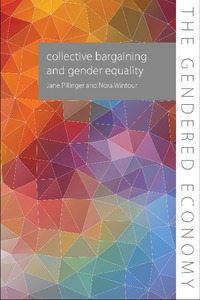Collective bargaining and gender equality

Pillinger, Jane ; Wintour, Nora
2019
192 p.
collective bargaining ; gender ; gender equality ; precarious employment ; informal employment ; global agreement ; trade union
Collective bargaining
English
Bibliogr.;Index
"Description
Collective bargaining has been a major force in delivering social justice and decent work in the workplace. However, the role of collective bargaining in achieving gender equality in the workplace is relatively under-researched.
In this book, Jane Pillinger and Nora Wintour investigate the complex and expanding area of collective union action for women's rights in the workplace. They explore how the feminization of unions in both developing and developed countries is changing bargaining agendas to address such issues as equal pay for work of equal value, work–life balance, maternity and parental leave rights, non-discrimination in access to employment, and the spill-over of domestic violence into the workplace.
The authors examine recent policy developments by the International Labour Organization, the United Nations, and the European Union, alongside many examples of national and industry-specific collective agreements to showcase how collective bargaining can be an effective tool for progressing equality in the workplace.
Contents
Foreword by Series Editors
1. Introduction
2. The gender dimensions of collective bargaining
3. Collective bargaining as a tool for gender equality: evidence from across the world
4. Changing employment patterns, precarious and informal work, and the challenge for collective bargaining
5. The global dimension of collective bargaining: the role of global framework agreements in promoting gender equality
6. Conclusion"
Digital
ISBN (PDF) : 9781788210775
The ETUI is co-funded by the European Union. Views and opinions expressed are however those of the author(s) only and do not necessarily reflect those of the European Union or the ETUI.